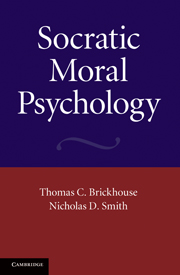Book contents
- Frontmatter
- Contents
- Acknowledgments
- Introduction
- 1 Apology of Socratic studies
- 2 Motivational intellectualism
- 3 The “prudential paradox”
- 4 Wrongdoing and damage to the soul
- 5 Educating the appetites and passions
- 6 Virtue intellectualism
- 7 Socrates and his ancient intellectual heirs: Plato, Aristotle, and the Stoics
- Appendix: is Plato's Gorgias consistent with the other early or Socratic dialogues?
- Bibliography
- Index of passages
- General index
4 - Wrongdoing and damage to the soul
Published online by Cambridge University Press: 04 August 2010
- Frontmatter
- Contents
- Acknowledgments
- Introduction
- 1 Apology of Socratic studies
- 2 Motivational intellectualism
- 3 The “prudential paradox”
- 4 Wrongdoing and damage to the soul
- 5 Educating the appetites and passions
- 6 Virtue intellectualism
- 7 Socrates and his ancient intellectual heirs: Plato, Aristotle, and the Stoics
- Appendix: is Plato's Gorgias consistent with the other early or Socratic dialogues?
- Bibliography
- Index of passages
- General index
Summary
THE MORAL PARADOX AND THE RISKS OF WRONGDOING
Damaging one's soul
At Apology 30c7–e1, Socrates cautions his jurors about the risk they face. The risk Socrates himself faces is obvious but, as he explains it, the danger he faces is far less grave than the one the jurors may inflict upon themselves:
Rest assured that if you kill me – since I am the person I say I am – you wouldn't harm me more than you harm yourselves. Neither Meletus nor Anytus could do anything to harm me; it isn't even possible. For I don't think it's divinely sanctioned for a better man to be harmed by a worse. Doubtless, he could kill me, or send me into exile, or take away my rights, and doubtless he and others also think these things are great evils. But I don't. In fact, I think that what he's doing now – trying to kill a man unjustly – is a much greater evil. Athenians, at this point I'm far from making this defense on my behalf, as one might think, but instead I'm making it on yours, so that by condemning me you don't make a terrible mistake regarding the gift the god has given you.
Now, the claim that trying to kill a man unjustly is a greater evil than being killed unjustly may seem simply obvious from a moral point of view.
- Type
- Chapter
- Information
- Socratic Moral Psychology , pp. 89 - 131Publisher: Cambridge University PressPrint publication year: 2010



